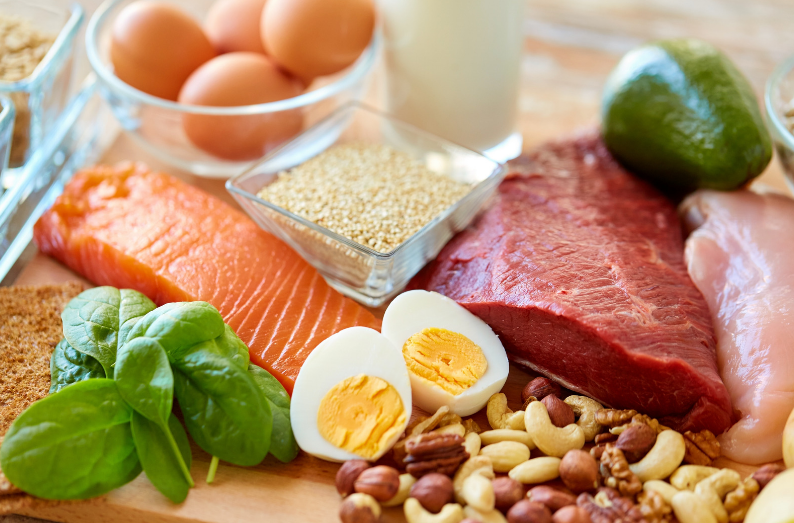
When it comes to weight loss and lifestyle overhauls, it can be tempting to gravitate toward diets that are big on promises—but those promises often come with heavy restrictions and unreasonable recommendations. Defying common sense, these gimmicky plans often allow uncontrolled consumption of certain foods while completed excluding others. Unfortunately, this "all or nothing" mentality is sure to backfire eventually, leaving you stranded far from the finish line. To ensure you stay the course and establish sustainable eating habits for lifelong health, it's best to avoid these three common dietary ditches.
1. “Low fat is always better.”
Ever since the low-fat craze of the 80s and 90s, Americans have latched onto the notion that if something is labeled "low-fat", it must be better for your health and for weight loss. From cookies and crackers to boxed dinners and frozen meals, low-fat and nonfat options popped up in every grocery aisle and we bought into the idea that cutting out fat would shrink our waistlines.
While it is true that fats and oils are high in calories, fat is a vital macronutrient and may comprise upwards of 35 to 40 percent of calories in a moderate-fat plan such as the Mediterranean diet. Before you run scared, know that fat brings some fantastic benefits to the table! Not only does it promote satiety and enhance flavor, but fat is also essential for brain health, normal hormone production, and the absorption of fat-soluble vitamins A, D, E, and K.
Though the research regarding fats is mixed, most experts agree that choosing plant-based fat sources most of the time is your best bet. Nuts and seeds are rich in heart-healthy fats, B vitamins and numerous minerals, and are also linked to improved cholesterol, lower risk of stroke and even weight management. Oils rich in monounsaturated fat, such as olive and canola oils, are also associated with reduced risk for heart disease and improved lipid profiles. Oily cold-water fish like salmon and tuna are an excellent source of omega-3 fatty acids, which boast anti-inflammatory properties as well as a wide range of disease-fighting benefits. Regardless of which eating plan you choose, don’t forget to include healthy fats as an important part of your balanced diet.
2. “All sugar is always bad for you!”
While the average American certainly consumes more than the recommended amount of sugar, not all foods containing sugar are bad for you. There are many foods that, despite having natural sugars, are also loaded with important vitamins, minerals, fiber, antioxidants and more. Fruit, for example, derives virtually all of its calories from sugar and still serves up a bevy of wellness and health-protective benefits. Though it contains moderate amounts of natural sugars called lactose, milk is a great source of complete protein and an excellent source of bone-building calcium.
While most of us should certainly make an effort to watch out for overly sweetened fare and curb our overuse of added sugars, there’s no need to forego wholesome foods with disease-fighting benefits simply because they contain a bit of sugar. By reducing your intake of obvious offenders—regular soda, candy, heavily processed foods, pastries, processed desserts—you can still have plenty of room to enjoy healthier options that come with some sweet advantages!
3. "Don't even get me started on carbs!"
From Atkins to keto, many popular diets would like you to blame your weight woes on carbohydrates, a blanket term that includes starches, fiber and sugar. But should you really ditch an entire micronutrient in the pursuit of shedding a few pounds? While it can be easy to overeat carbs—especially the processed variety—this oft demonized macro is an important nutrient for energy, health, exercise and so much more. Carbohydrates are especially important for athletes and anyone who exercises regularly. Carbs are broken down into glucose, which is then absorbed by the bloodstream and used as energy to fuel your body, so if you regularly feel rundown during a workout, it could be beneficial to add a light carbohydrate snack to your pre-workout plan.
Not sure where you stand? It's time to take a closer look at your typical macronutrient breakdown—that is, how much carbohydrate, protein and fat are you consuming in your diet? Though this might seem a daunting task, there are a variety of nutrition calculators that make these calculations a snap. With a bit of dutiful food journaling, you can get a clear picture of exactly where your calories are coming from and if you need to make any adjustments. While you may need to cut back on certain carbohydrates, odd are that your food logs will also shed light on other areas of improvement. With a few smart tweaks, you really can have your carbs and reach your goals, too!
4. “I don’t need to pay attention to how much protein I eat.”
With so much focus on carbohydrates and fat, who has time to think about protein? Why does it matter anyway? Whether you’re trying to build muscle, take your workouts to the next level or lose weight, dialing up your protein intake can make a big difference when it comes to reaching your goals. But, as with many nutrients, it's a balancing act. On the one hand, not getting enough protein can lead to muscle loss, impaired recovery and lackluster fitness; on the other hand, getting too much can crowd out other nutritious foods and result in unwanted pounds on the scale.
The magic protein number will differ from person to person. A typical active person needs about 0.5 to 0.7 grams per pound of body weight, or 0.8 grams per pound if weight loss is the goal. This could amount to anywhere from 18 to 28 percent of calories for a 175-pound person following a 2000-calorie diet. For sedentary individuals, the Dietary Reference Intake is 56 grams per day for men and 46 grams for women. Online food journaling tools are a great way to get a sense of just how much protein you usually eat and where you might have room for improvement.
Beyond the number crunching, look to include a bit of protein at each of your meals and snacks. Doing so will give your body the steady supply of amino acids it needs for muscle support, training and recovery. For athletes, including protein as a primary source of fuel after intense exercise is key. While animal-based choices such as poultry, beef, pork, fish, dairy and eggs serve up complete protein with all the essential amino acids our bodies require, plant-based choices can easily be mixed and matched to the same end. If your diet of choice doesn't emphasize the importance of protein, it may be best to walk away—protein shake in hand.
Balance, Variety and Moderation
When it comes down to it, every nutrient has a vital role to play in our health and wellbeing. While there’s no single “right” diet that works for everyone, plans that promote balance, variety and moderation will keep you out of these dietary ditches and enable you to reach your goals without compromising your health or your common sense.













